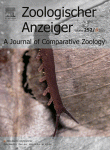
ZOOLOGISCHER ANZEIGER
Scope & Guideline
Elevating Scholarly Discourse in Zoology
Introduction
Aims and Scopes
- Taxonomy and Systematics:
The journal extensively publishes research on the classification and naming of animal species, including descriptions of new species and revisions of existing taxa across various groups, such as insects, amphibians, and crustaceans. - Morphological Studies:
Research often highlights detailed morphological analyses, employing techniques like geometric morphometrics, histology, and ultrastructure to understand structural adaptations and their implications for taxonomy and evolution. - Phylogenetic Relationships:
Papers frequently explore the evolutionary relationships among species using molecular and morphological data, contributing to the understanding of biodiversity and the evolutionary history of different taxa. - Ecological and Environmental Studies:
The journal includes studies that examine the ecological roles and adaptations of species, particularly in response to environmental changes, thereby linking morphology and taxonomy to ecological dynamics. - Integrative Approaches:
There is a consistent emphasis on integrative taxonomic approaches that combine morphological, molecular, and ecological data to provide a more comprehensive understanding of species diversity and relationships.
Trending and Emerging
- Molecular Phylogenetics:
There is a growing trend towards utilizing molecular techniques, such as DNA barcoding and mitochondrial genome analysis, to resolve taxonomic ambiguities and investigate evolutionary relationships among species. - Geometric Morphometrics:
The application of geometric morphometric methods for analyzing shape variation has gained traction, providing new insights into morphological diversity and its implications for taxonomy. - Integrative Taxonomy:
An increasing number of studies are adopting integrative approaches that combine morphological, molecular, and ecological data, reflecting a holistic view of species classification and diversity. - Ecological Adaptations:
Research examining the ecological adaptations of species, particularly in response to climate change and habitat alteration, is on the rise, highlighting the importance of linking ecology with taxonomy. - Cryptic Species Diversity:
There is an emerging focus on uncovering cryptic species through integrative methods, revealing previously unnoticed biodiversity and its implications for conservation efforts.
Declining or Waning
- Behavioral Studies:
Research focusing on animal behavior has seen a decrease in frequency, possibly due to a shift towards more integrative and molecular approaches in zoological research. - Historical Taxonomy:
There is a noticeable reduction in papers that focus solely on historical taxonomy or nomenclature discussions without accompanying morphological or molecular data. - Conservation Biology:
While still relevant, the representation of conservation-focused studies appears to be diminishing, possibly as the journal emphasizes more on taxonomy and systematics rather than applied ecological research. - Physiological Studies:
Research centered on physiological aspects of animal biology has become less prevalent, with more emphasis placed on morphology and phylogenetics.
Similar Journals

Insect Systematics and Diversity
Empowering the Future of Entomological ScholarshipInsect Systematics and Diversity, published by Oxford University Press Inc., stands as a leading journal in the realm of entomological research, boasting an impressive impact factor driven by its rigorous peer-review process and high-quality publications. With a focus on animal science, zoology, developmental biology, and insect science, the journal is expertly positioned to address the complexities of insect evolution, behavior, and ecological interactions. Since its inception in 2017, the journal has rapidly gained recognition, achieving Q1 quartile ranks in multiple categories, including Insect Science and Ecology, Evolution, Behavior, and Systematics, indicating its relevance and prestige within the academic community. Researchers, professionals, and students alike will find invaluable insights, methodologies, and discussions that propel the understanding of insect diversity and systematics, ensuring the journal is an essential resource for advancing knowledge in this dynamic field. The journal provides access to a wealth of information, fostering collaboration and engagement within the global scientific community.

Vertebrate Zoology
Exploring the Depths of Vertebrate DiversityVertebrate Zoology is a prestigious open-access journal published by the Staatliches Museum Tierkunde Dresden in Germany, focusing on the intricate and diverse field of animal biology. With an ISSN of 1864-5755, the journal has established itself as a vital resource for researchers, professionals, and students in the realms of Animal Science and Ecology, Evolution, Behavior, and Systematics. Since transitioning to open access in 2021, it has expanded accessibility and global dissemination of research findings, showcasing significant studies that contribute to our understanding of vertebrate fauna. The journal's impressive Q1 quartile rankings in both Animal Science and Zoology, as well as Ecology and Evolution, underscore its influence within the academic community—ranking #95 and #220 in their respective categories according to Scopus. Spanning from 2011 to 2024, Vertebrate Zoology aims to provide a comprehensive platform for innovative research, fostering collaboration and advancing knowledge across the biological sciences.
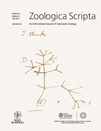
ZOOLOGICA SCRIPTA
Championing impactful studies in ecology and behavior.Zoologica Scripta, published by Wiley, stands as a distinguished journal within the fields of Animal Science and Zoology, Ecology, Evolution, Behavior and Systematics, Genetics, and Molecular Biology. With its inception dating back to 1971 and a convergence year extending to 2024, this journal consistently provides a platform for high-quality research, earning a Q1 ranking in two key categories and solid performance in additional fields, as evidenced by its significant Scopus rankings and impressive percentiles. Notably, it ranks 36 out of 490 journals in Animal Science and Zoology, placing it in the 92nd percentile. While Zoologica Scripta operates under a traditional access model, its rigorous peer-review process ensures that only the most impactful studies make their way into its pages. With a focus on advancing our understanding of biodiversity and evolutionary processes, this journal is indispensable for researchers, professionals, and students committed to the ongoing exploration of animal sciences and ecological studies.

CONTRIBUTIONS TO ZOOLOGY
Pioneering Research in Ecology and EvolutionCONTRIBUTIONS TO ZOOLOGY, published by BRILL, is a premier scholarly journal dedicated to advancing the field of zoological sciences. With an ISSN of 1383-4517 and an E-ISSN of 1875-9866, this journal serves as a vital platform for researchers, professionals, and students seeking to share their findings and insights related to animal science, ecology, evolution, and systematics. Recognized for its high academic standards, it ranks in the top quartile (Q1) for Animal Science and Zoology, and Q2 for Ecology, Evolution, Behavior, and Systematics, reflecting its significance and influence in the scholarly community. The journal has been consistently published since 1994 and continues to contribute pivotal knowledge that informs and shapes contemporary zoological research. Researchers can access the journal through traditional subscription models, ensuring broad dissemination of its impactful articles and studies. Contributions to Zoology plays an essential role in fostering collaboration and discussion within the zoological community in the Netherlands and beyond.
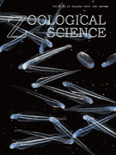
ZOOLOGICAL SCIENCE
Advancing the Frontiers of Animal ScienceZoological Science, published by the Zoological Society of Japan, is a leading journal dedicated to the fields of animal science and zoology. With its ISSN 0289-0003, this respected publication has established itself as a prominent source of scientific research, attaining a commendable Q2 ranking in the 2023 category of Animal Science and Zoology. Spanning over three decades, from 1992 to 2024, the journal offers a valuable platform for scholarly articles that explore various aspects of zoology, including ecology, behavior, and evolutionary biology. Although it operates under a traditional subscription model, its contributions are supported by a robust community of researchers and professionals who value its insights. The journal strives to foster academic discourse and insights that drive understanding and conservation of wildlife, making it an essential resource for students and established experts alike. The publishing headquarters located in Tokyo, Japan, further enhances its international reach and influence in zoological studies.
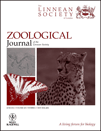
ZOOLOGICAL JOURNAL OF THE LINNEAN SOCIETY
Championing scholarly excellence in zoological studies.Zoological Journal of the Linnean Society, published by Oxford University Press, stands as a prestigious vessel for scholarly discourse in the fields of Animal Science and Ecology. With an ISSN of 0024-4082 and E-ISSN 1096-3642, this journal has an illustrious history dating back to its inception in 1866, and has consistently contributed groundbreaking research that shapes our understanding of zoology and evolutionary biology. Operating out of the United Kingdom, the journal boasts an impressive Q1 ranking in both Animal Science and Zoology and Ecology, Evolution, Behavior and Systematics, positioning it among the top tier of its category. With a significant presence in the academic landscape, the journal ranks 24th among 490 in Animal Science and 97th among 721 in Ecology, reflecting its impact and relevance in the field. Although it is not an open access journal, the wealth of knowledge it offers is invaluable for researchers, professionals, and students alike, aiding in the advancement of zoological sciences.

Arthropod Systematics & Phylogeny
Exploring the evolutionary tapestry of arthropods.Arthropod Systematics & Phylogeny is a pivotal journal published by the SENCKENBERG NATURHISTORISCHE SAMMLUNGEN DRESDEN, MUSEUM TIERKUNDE in Germany, dedicated to advancing the understanding of arthropod systematics, phylogenetics, and evolutionary biology. With an ISSN of 1863-7221 and an E-ISSN of 1864-8312, this journal has established itself as a reputable source for high-quality research, evident by its ranking in the Q1 category for Insect Science and Q2 in Genetics. Covering a spectrum of subjects within the realms of agricultural and biological sciences, it caters to a diverse audience of researchers, professionals, and students eager to explore the intricate relationships and evolutionary histories of diverse arthropod taxa. The journal has been consistently publishing impactful studies since its inception in 2009, with ongoing contributions expected to bolster its presence in the academic community through 2024 and beyond. Although it currently does not offer open access options, its rich content serves as a valuable resource for those passionate about entomology and genetics, fostering collaboration and innovation in an important area of biological research.
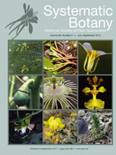
SYSTEMATIC BOTANY
Elevating Knowledge in Plant BiodiversitySystematic Botany, published by the American Society of Plant Taxonomists, is an esteemed journal focusing on the diverse fields of plant taxonomy, systematics, and evolution. With an ISSN of 0363-6445 and an E-ISSN of 1548-2324, this journal serves as a critical platform for researchers aiming to advance our understanding of plant biodiversity and evolutionary relationships. Operating since 1994, Systematic Botany has garnered significant recognition, achieving a Q2 ranking in Ecology, Evolution, Behavior and Systematics, and Plant Science categories, and ranking within the top half of Scopus for Genetics. The journal prioritizes publishing high-quality, peer-reviewed research, making it an essential resource for academics, practitioners, and students alike. Although it does not provide open access options, the journal's robust reputation in both American and international botanical research speaks to its pivotal role in disseminating vital scientific knowledge in the field. For those interested in the latest advancements in plant science, Systematic Botany is indispensable.

ACTA ENTOMOLOGICA MUSEI NATIONALIS PRAGAE
Charting New Territories in Ecology and EvolutionACTA ENTOMOLOGICA MUSEI NATIONALIS PRAGAE, published by the esteemed NARODNI MUZEUM - PRIRODOVECKE MUZEUM in the Czech Republic, is an influential journal in the fields of Ecology, Evolution, Behavior and Systematics, as well as Insect Science. With an ISSN of 0374-1036 and an E-ISSN of 1804-6487, this journal has established itself as a vital resource for researchers, professionals, and students interested in the intricate world of entomology. Spanning publications from 2005 to 2024, it is recognized for its contributions to the understanding of insect biology, offering insights on ecological interactions and evolutionary relationships. Although it operates as a subscription-based platform, the journal maintains a respectable presence in scholarly circles, positioned in the Q2 quartile for both relevant categories in 2023. ACTA ENTOMOLOGICA serves not only as a repository of significant empirical findings but also as a discourse platform for emerging entomological concepts, making it an essential read for those involved in the biological sciences.
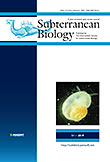
Subterranean Biology
Advancing Knowledge in Hidden Biological RealmsSubterranean Biology is a premier open-access journal published by the International Society of Subterranean Biology, dedicated to advancing knowledge in the field of subterranean ecosystems. With an impact factor that reflects its significance in the academic community, this journal has achieved a commendable ranking of Q1 in Animal Science and Zoology and Q2 in multiple categories including Ecology, Evolution, Behavior and Systematics, Nature and Landscape Conservation, and Soil Science, based on its 2023 category quartiles. Located in Bulgaria and affiliated with the Department of Animal Biology at the University of Rome, the journal has been fostering open scientific discourse and accessibility since 2011. With its ISSN 1768-1448 and E-ISSN 1314-2615, it aims to provide a platform for researchers and students to explore the complexities of subterranean life forms and their ecological implications. By publishing a wide range of research articles, reviews, and case studies, Subterranean Biology empowers its readers to delve deeper into the hidden realms of our natural world.